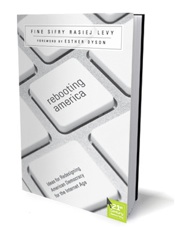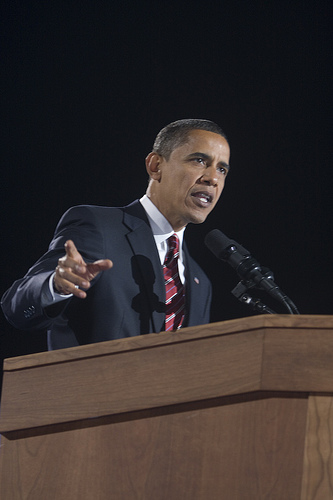Voting
Crowdsourcing Election Verification, part 3
In part 1 I advocated photographing your completed ballot before submitting it and posting your photograph online. Turns out that if you followed this piece of advice in Missouri, you might be in jail right now. Oops! Sorry :-)…
Rebooting America
Anyone interested in how technology and policy can work together to form us a more perfect union should read Rebooting America. If your budget is tight right now, you can download the PDF version for free.
While you are at it, check out the Personal Democracy Forum which is the larger effort that Rebooting America is part of.
…“Never doubt that a small group of thoughtful, committed people can change the world. Indeed. It is the only thing that ever has.”
Margaret Mead
How Grandma Saved Democracy
Visiting my 90 year old grandma a couple of weeks ago, I saw the opportunity for a product that I think would have a lot of success in the marketplace. Like the iPhone though, it’s not so much the idea — I’m sure someone is working on or already has the idea — but rather in the implementation and interface.…
Crowdsourcing Election Verification, part 2
Back in June, I suggested that public voting records would be healthy for our democracy if the populace were comfortable revealing their voting records. There is now a movement* and new web site for this called Who Voted? though they are not going as far as I am in advocating for revealing your actual choices.…
National Popular Vote
Yesterday I blogged about personal vote verification. At the group level, I recommend supporting the National Popular Vote. While most people (70%) favor a popular vote for president, the U.S. Constitution calls for an electoral college system. The National Popular Vote movement is extremely clever in that it doesn’t require a constitutional change:
…Under the U.S. Constitution, the states have exclusive and plenary (complete) power to allocate their electoral votes, and may change their state laws concerning the awarding of their electoral votes at any time. Under the National Popular Vote bill, all of the state’s electoral votes would be awarded to the presidential candidate who receives the most popular votes in all 50 states and the District of Columbia. The bill would take effect only when enacted, in identical form, by states possessing a majority of the electoral votes—that is, enough electoral votes to elect a President (270 of 538).
Crowdsourcing Election Verification
I take it as accepted fact at this point that the 2004 U.S. Presidential Election would have gone to John Kerry if everyone who attempted to vote that day were able to and all the votes were counted correctly. Here’s the the Wikipedia entry on the subject and here’s a documentary to get you started.…
Eliminating Political Parties
This is a repost from my MySpace blog, but it really belongs here.
Why Political Parties Exist, Why they are Bad, and How to Eliminate Them
Voting blocs are an emergent property of representative democracies wherein each new voting issue carries with it an automatic right for each representative to vote. In other words, when votes are treated like a continually renewable resource, there becomes incentive for each representative to give away votes on issues they care less about in exchange from something of greater value. When that thing of greater value is money we call it corruption. When the thing of greater value is a promise of future support from an outside agency, we call it lobbying. And when groups of representatives agree on an ongoing basis to trade away votes in exchange for membership, we call it a party.…

